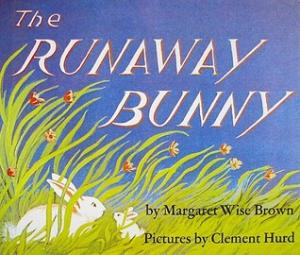Runaway bunny, never going back, wrong way on a one-bunny track...

This book can be taken in a couple different ways. I definitely understand both of them. Basically, the first sentence is, "Once there was a little bunny who wanted to run away." And then he keeps saying things like, "I want to run away," and his mom says she'll follow him. He says he'll become a fish, and she says she'll become a fisherman, et cetera, et cetera. And then eventually he says, "I will become a little boy and run into a house." And she says, "If you become a little boy and run into a house, I will become your mother and catch you in my arms and hug you." And then he says, "Shucks. I might as well just stay where I am and be your little bunny." And the book says, "And so he did."
The intended interpretation of this is clearly that the mother's love for her little bunny transcends everything, basically. She's not going to give up on him if he becomes a flower in a garden, or whatever. The problem stems from the first line, basically, and the fact that it is so simple, and therefore open to interpretation. "Once there was a little bunny who wanted to run away." Well, why did he want to run away? I think the interpretation of the mother's love as being sweet and transcendent comes from interpreting that line as, "Kids sometimes get mad at their parents and want to run away." It happens. I threatened it when I was a kid. But there are certain circumstances where the child may legitimately want to get away from their parent. And that's where the alternative interpretation stems from: "No matter where you go, I'll find you." It becomes ominous. There's a difference between saying, "Don't run away, it's dangerous out there and I'm worried about your safety," and "I'm going to follow you." And there's a difference between saying, "If you run away, you will always have a place to come back to," and "You're not allowed to run away." And that's really what it boils down to. Maybe it's a generational thing. There's another similar book titled, "Mama, Do You Love Me" which doesn't have this problem. It instead has the child ask about certain hypothetical situations and whether the mother would still love them. Of course the mother still loves the child, no matter what. But that's different. The little bunny in this book isn't asking, "Would you still love me if I ran away," he's saying, "I'm going to run away." And she's basically saying, "No, you're not." And again, that's a little bit of a more authoritarian stance than more parents nowadays try to take. It's more authoritarian than I want to be. I own this book; it was given to me as a gift. I try to be as positive in my interpretation of it as possible, but it's really difficult sometimes.